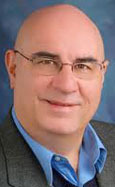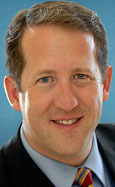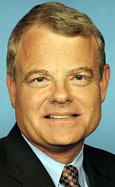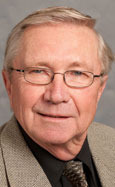County officials call for farm bill before elections
March 28, 2012 | 07:23 PM
The National Association of Counties today called for passage of a farm bill before this year's elections.

Lenny Eliason
“It’s critical [to pass the farm bill] before the election,” NACo President Lenny Eliason told congressional aides today at a briefing on the rural development title of the farm bill. Eliason, an Athens County, Ohio, commissioner, said passage is needed to allow farmers and others with an interest in the farm bill to plan for the future.
Passage this year, he said, would counter Congress’s “do-nothing” image.
Lou Barron, a Linn County, Iowa, supervisor who chairs NACo’s Rural Action Caucus, also urged Democrats and Republicans in Congress to work together, contending that there is bipartisanship in rural America, where potholes are not filled by Democrats or Republicans but because they “need to be filled.”
NACo represents the nation’s 3,068 counties, nearly two-thirds of which are designated as rural and have a population of more than 60 million people. The rural counties depend on the farm bill rural development title for infrastructure development, including provision of water and sewer in some of the country’s poorest areas, broadband, development of new rural clinics and hospitals, road and bridge construction and maintenance and financing of schools and businesses.

Rep. Adrian Smith, R-Neb.
Rep. Adrian Smith, R-Neb., told the group that the rural development title “will not be as contentious as the nutrition title, where 78 percent of the money is, or the commodity title."
"Most of the debate will be around crop insurance and food stamps,” Smith said.

Rep. Mike McIntyre, D-N.C.
Rep. Mike McIntyre, D-N.C., said that programs to provide water and sewer services and fire protection are vital because communities can’t get companies to provide jobs without adequate water and sewer, and that fire protection reduces insurance rates.
The National Association of Development Organizations (NADO), which represents regional economic development agencies, NACo, and other groups are united in a Campaign for a Renewed Rural Development.
They noted in a paper released last September that the rural development title does not have baseline for the next farm bill, but urged Congress and the Obama administration to work together to make sure the programs continue.
Eliason noted that his county recently provided water and sewer to 11,000 homes of low-income people, but said it couldn’t be done without funding from USDA’s water and sewer program.
He added that those homeowners are now paying $56 per month for service, but would have to pay an unaffordable $125 per home without funding from USDA to build the system. Without water and sewer, Eliason said, it is impossible to attract businesses to a community.

Don Larson
Don Larson, a Brookings County, S.D., commissioner, urged the congressional aides to “come out to rural America and see the impact of one project called broadband.” High-speed Internet service, Larson said, means that “people can have a career even their mate in life is involved in agriculture.”
Eliason and Larson acknowledged that high commodity prices and rural development have made rural America more prosperous than in the past, but USDA help is still needed to provide vital infrastructure. Eliason noted that rural America cannot depend on its own tax base because it does not have “the critical mass” of population.
An official from Defiance County, Ohio, said that his county has re-evaluated farm land as prices have gone up, but that the re-evaluation increased county revenues by only $27,000 per year. Farmers need to invest their money in new equipment, he said.
The county officials said Congress and the Agriculture Department should give counties flexibility in dealing with programs and develop one definition of “rural,” but also acknowledged that NACo is too diverse to take a position on the definition.
The 2008 farm bill called on the Agriculture Department to write a report on the many definitions of rural in rural development programs and to give guidance to Congress on the definition, but USDA has not yet submitted that report.
Agriculture Secretary Tom Vilsack and Undersecretary for Rural Development Dallas Tonsager have both said that coming up with a single definition is difficult because rural areas across the country are so different.
Experienced Capitol Hill aides have said the reason there are so many definitions is because lawmakers who have written sections of past farm bills have wanted to make sure their districts got included in a specific program, while also wanting to make sure that the money did not get siphoned off to urban areas.
Both USDA and NACo officials have said that the definitions are increasingly problematic as rural America changes and has more interaction with nearby urban areas.
Representing both NACo and NADO at a House Agriculture subcommittee hearing last month, Larson said, “Our organizations encourage you to avoid getting bogged down in the regional fights that erupt when definitions are considered. Instead, we encourage you to focus on providing enhanced flexibility for USDA Rural Development’s state offices to provide assistance that fits the uniquely rural nature of their states, by focusing on serving rural regions, both multi-town and multi-county.”
Eliason said today that NACo would leave the definition of rural America up to Congress and the Agriculture Department, and that he believes “a majority of people” will accept whatever that definition is.
He also said that the government should come with a way to simplify application forms and allow counties to use the same application to different federal agencies when more than one agency is involved in a project or solving a problem. The departments of Housing and Urban Development and Health and Human Services have already made progress have already on their application forms, he said.
In a paper on the farm bill released last September, the Campaign for a Renewed Rural Development said:

Lenny Eliason
“It’s critical [to pass the farm bill] before the election,” NACo President Lenny Eliason told congressional aides today at a briefing on the rural development title of the farm bill. Eliason, an Athens County, Ohio, commissioner, said passage is needed to allow farmers and others with an interest in the farm bill to plan for the future.
Passage this year, he said, would counter Congress’s “do-nothing” image.
Lou Barron, a Linn County, Iowa, supervisor who chairs NACo’s Rural Action Caucus, also urged Democrats and Republicans in Congress to work together, contending that there is bipartisanship in rural America, where potholes are not filled by Democrats or Republicans but because they “need to be filled.”
NACo represents the nation’s 3,068 counties, nearly two-thirds of which are designated as rural and have a population of more than 60 million people. The rural counties depend on the farm bill rural development title for infrastructure development, including provision of water and sewer in some of the country’s poorest areas, broadband, development of new rural clinics and hospitals, road and bridge construction and maintenance and financing of schools and businesses.

Rep. Adrian Smith, R-Neb.
Rep. Adrian Smith, R-Neb., told the group that the rural development title “will not be as contentious as the nutrition title, where 78 percent of the money is, or the commodity title."
"Most of the debate will be around crop insurance and food stamps,” Smith said.

Rep. Mike McIntyre, D-N.C.
Rep. Mike McIntyre, D-N.C., said that programs to provide water and sewer services and fire protection are vital because communities can’t get companies to provide jobs without adequate water and sewer, and that fire protection reduces insurance rates.
The National Association of Development Organizations (NADO), which represents regional economic development agencies, NACo, and other groups are united in a Campaign for a Renewed Rural Development.
They noted in a paper released last September that the rural development title does not have baseline for the next farm bill, but urged Congress and the Obama administration to work together to make sure the programs continue.
Eliason noted that his county recently provided water and sewer to 11,000 homes of low-income people, but said it couldn’t be done without funding from USDA’s water and sewer program.
He added that those homeowners are now paying $56 per month for service, but would have to pay an unaffordable $125 per home without funding from USDA to build the system. Without water and sewer, Eliason said, it is impossible to attract businesses to a community.

Don Larson
Don Larson, a Brookings County, S.D., commissioner, urged the congressional aides to “come out to rural America and see the impact of one project called broadband.” High-speed Internet service, Larson said, means that “people can have a career even their mate in life is involved in agriculture.”
Eliason and Larson acknowledged that high commodity prices and rural development have made rural America more prosperous than in the past, but USDA help is still needed to provide vital infrastructure. Eliason noted that rural America cannot depend on its own tax base because it does not have “the critical mass” of population.
An official from Defiance County, Ohio, said that his county has re-evaluated farm land as prices have gone up, but that the re-evaluation increased county revenues by only $27,000 per year. Farmers need to invest their money in new equipment, he said.
The county officials said Congress and the Agriculture Department should give counties flexibility in dealing with programs and develop one definition of “rural,” but also acknowledged that NACo is too diverse to take a position on the definition.
The 2008 farm bill called on the Agriculture Department to write a report on the many definitions of rural in rural development programs and to give guidance to Congress on the definition, but USDA has not yet submitted that report.
Agriculture Secretary Tom Vilsack and Undersecretary for Rural Development Dallas Tonsager have both said that coming up with a single definition is difficult because rural areas across the country are so different.
Experienced Capitol Hill aides have said the reason there are so many definitions is because lawmakers who have written sections of past farm bills have wanted to make sure their districts got included in a specific program, while also wanting to make sure that the money did not get siphoned off to urban areas.
Both USDA and NACo officials have said that the definitions are increasingly problematic as rural America changes and has more interaction with nearby urban areas.
Representing both NACo and NADO at a House Agriculture subcommittee hearing last month, Larson said, “Our organizations encourage you to avoid getting bogged down in the regional fights that erupt when definitions are considered. Instead, we encourage you to focus on providing enhanced flexibility for USDA Rural Development’s state offices to provide assistance that fits the uniquely rural nature of their states, by focusing on serving rural regions, both multi-town and multi-county.”
Eliason said today that NACo would leave the definition of rural America up to Congress and the Agriculture Department, and that he believes “a majority of people” will accept whatever that definition is.
He also said that the government should come with a way to simplify application forms and allow counties to use the same application to different federal agencies when more than one agency is involved in a project or solving a problem. The departments of Housing and Urban Development and Health and Human Services have already made progress have already on their application forms, he said.
In a paper on the farm bill released last September, the Campaign for a Renewed Rural Development said:
- USDA should clarify its mission to move beyond its role “as a lender of last resort helping individuals and communities” to become the catalyst for organizing all federal, state, regional and local actors to work together with a goal “that rural individuals, communities and regions have the best chance to thrive, not merely survive.”
- The Rural Development division of USDA should give up requiring communities and regions to fit the criteria for very specific programs and make it easier for county, multi-county and even multi-state regional partnerships to work together and qualify for funding.
- All existing Rural Development programs should provide an advantage to applications from programs that are coordinated with regional development plans and give a bonus in funding for programs that fit in with regional development plans.
- Rural Development should continue to provide technical assistance to small rural communities with few or no full-time staff and experience in planning and securing funding for large infrastructure and economic development projects.
- Congress should authorize a technical assistance set-aside for small communities to provide vital services such as public safety, health care and education.
- Rural Development should create an online searchable database, which would allow Congress and the public to view all USDA applicants and funded projects.